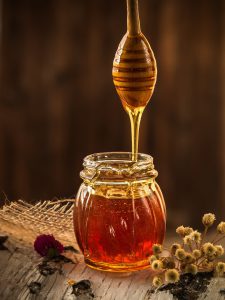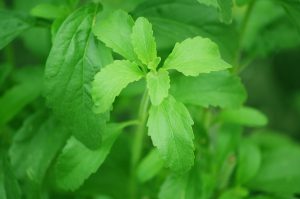How many cookies or other sweets have you had so far this festive season? OK, don’t answer that – and no judgment! But you might be starting to feel a little, well, uncomfortable with your sugar consumption, right? But instead of swearing the sweet stuff off completely (that’s pretty tough!), you might want to turn to alternatives to refined cane sugar. Those might be the most natural of alternatives, like maple syrup or honey, or more artificial ways to get your sweet on, but are any of them actually better for you? Or could some of them even be worse? So, in the middle of this holiday cookie-fest, we want to get down to answering all of your pressing questions about the sweet stuff!
How Big Is Our Sugar Obsession?
Get this: the average American adult, teenager, and child consumes about 17 teaspoons of added sugar a day, or about 270 calories (which is around 13% of the calories we take in every day). That translates into around 57 pounds of added sugar consumed each year, per person! That far exceeds the recommended daily limit – in most cases, by around 3 times.
All this should come as no surprise, considering that 3 out of 4 products on grocery store shelves contain added sugar. Sugar – in all of its forms – is nearly impossible to avoid, but our overconsumption of most kinds can lead to:
- Heart disease – Eating 12–30 teaspoons of added sugar per day increases the risk of dying from heart disease by nearly one-third compared to those who eat less sugar. Eating more than 30 teaspoons increases the risk by nearly 3 times. Sugar contributes to more than 52,000 deaths from cardiovascular disease every year in the US.
- Diabetes – Consuming the equivalent amount of sugar to that in just 1 -2 12-oz sodas per day can increase your risk of developing type 2 diabetes by 26% and the risk of developing hypertension by 12%. More than 1 in 3 US adults has pre-diabetes, and 40% of all children are predicted to develop diabetes in their lifetime.
- Dental decay – Regular sugary soda consumption is associated with nearly twice the risk of dental decay in children. Adults who drink 1-2 sugary drinks per day have 30% more dental disease compared with adults who consume no sugary drinks.
And those are just some of the risks associated with overconsumption of sugar (think: overweight or obesity and all of their related health complications). But would replacing certain forms of sweeteners with others make a difference? Maybe in some ways, but let’s take a closer look
Is Maple Syrup Better Than Refined Sugar?
We’re gonna give you the good news and the bad news about maple syrup, our favorite breakfast-time sweetener (and a great refined sugar alternative in baking). First here are the stats: one tablespoon of maple syrup contains 52 calories, 13.4 grams of carbohydrates, 0 grams of fiber, and 12.1 grams of sugar. How does that stack up to traditional refined sugar? Well, maple syrup has fewer calories: refined granulated sugar has 68 calories per teaspoon, and refined granulated sugar has more grams of sugar. But that being said, it has slightly fewer carbs than maple syrup.
OK, so far they’re not sounding all that different. But here’s one interesting thing: maple syrup’s fewer calories are not as empty as those of sugar. According to William Dixon, M.D., clinical assistant professor at Stanford School of Medicine and practicing emergency medicine physician, “Maple syrup has a nutritional advantage over sugar because it does not contain any additives, and the processing allows it to retain its nutrients, including manganese, riboflavin, zinc, magnesium, calcium, and potassium.”
Not only that, but maple syrup has a lower glycemic index than sugar, meaning it won’t spike your blood sugar in the same way, and it contains those little powerhouses, antioxidants, which help our cells fight off stress, and thus, illness. It also has anti-inflammatory and prebiotic activity, so it helps support gut health.
The bottom line: if it’s calories and sugar you’re worried about, switching to maple syrup is not going to make a huge difference. But if you’re looking for more nutritional bang for your buck from the things you consume, including your sweeteners, maple syrup wins every time over refined sugar.
Is Honey Better Than Refined Sugar?

So how about the sweet stuff given to us by the bees, honey? This lovely bit of golden goodness is actually even sweeter and carbier than maple syrup: a tablespoon of honey contains 63.8 calories, 17.3 grams of carbohydrates, and 17.2 grams of sugar, according to the USDA.
But with that being said, “Honey’s advantages over sugar include a slightly lower glycemic index (i.e. it doesn’t affect your blood-sugar levels as much). It also contains more vitamins, minerals, and antioxidants, such as calcium, potassium, vitamin C, zinc, phenolic acids, and flavonoids,” according to Dr. Dixon. It also has antioxidants, anti-inflammatory, and antibacterial properties, and beneficial bacteria for gut health, so like maple syrup, it’s a healthier choice than refined sugar in certain ways.
But even with all the advantages of maple syrup and honey, you still have to use them in moderation. At the end of the day, sugar is sugar, and both maple syrup and honey have a lot of it. They both still spike your blood sugar to some extent, and as Dr. Dixon says, “Maple syrup and honey may have a few advantages over table sugar, but they’re both considered to be added sugars. There’s strong evidence that higher sugar intake is associated with an increased risk for cardiovascular disease, type 2 diabetes, metabolic syndrome, some cancers, and obesity.” So go easy, but also remember that we don’t have to think about food as “bad” – all things can be enjoyed in a varied and balanced diet!
Are There Health Risks to Artificial Sweeteners?
So we’ve talked about the natural stuff, but what about those no/low-calorie artificial sweeteners that you often see out on tables and in packaged goods and diet sodas? While these might be tempting as a way to cut sugar out of your diet without losing the sweetness, you’re probably better off avoiding them and sticking with a natural sweetener, or better yet, cutting back on sweet stuff as much as possible.
Why? Well, there is mounting evidence that artificial sweeteners like aspartame (found in sweeteners like Equal, as well as in cereals, yogurt, candy, and diet soda) and sucralose (found in Splenda as well as baked goods, ice cream, canned fruit, flavored yogurt, and syrups), might actually be actively harmful. Just check out these recent findings:
- Participants in a September 2022 study who consumed large amounts of aspartame had a higher risk of stroke than people who didn’t consume the sweetener.
- In the same study, people who consumed high quantities of sucralose and acesulfame potassium, often used in “sugar-free” soda, had a higher risk of coronary heart disease.
- An August study found that consuming non-nutritive sweetener (sugar substitutes that contain few calories or nutrients) could alter a person’s gut microbes and potentially elevate blood sugar levels. High blood sugar can increase one’s risk of diabetes, heart disease, or stroke.
- A June lab study found that artificial sweeteners cause gut bacteria to invade cells in the intestine wall, which could raise the risk of infection or organ failure.
These sweeteners don’t sound all so sweet now, right? So again, it’s probably best not to use these artificial sweeteners as an alternative to real sugar. You’re better off just cutting back, or using natural sweeteners sparingly.
What Do We Know about “No-Calorie” Natural Sweeteners?
The truth is, the artificial sweeteners we talked about above are a little, well, old-fashioned. Nowadays, more people are switching to “natural” calorie-free sugar alternatives like stevia, monk fruit, erythritol, and xylitol. In fact, last August, research firm Nielsen reported that stevia sales had grown 11.9% year over year, while artificial sweetener sales were down an average of 6.6%. And Nielsen data from April 2018 showed that the use of monk fruit was up 20% in foods such as cereal and nutrition bars, and more than 150% in vitamins and lactose-free milk.

But are they safe? Well, both monk fruit and stevia are considered safe by the FDA, and there don’t seem to be any health risks associated with them. But with that being said, there is little data on monk fruit as of yet. Here are a few things we do know:
- Animal studies suggest stevia extracts are nontoxic. There also haven’t been any negative reactions reported in humans to date.
- A study of the effect of stevia extracts on fecal bacteria showed the bacteria balance wasn’t significantly affected.
- Research also shows stevia doesn’t raise blood sugar and doesn’t cause cavities the way sugars do. It may also help reduce insulin levels compared with artificial sweeteners: a study of 19 lean and 12 obese adults found that having stevia before a meal significantly lowered insulin levels after the meal compared with having aspartame, a sugar-free artificial sweetener.
- There is a possibility that low-calorie sweeteners cause people to feel hungrier – and thus overeat – when compared with sugar, but the studies so far are conflicting.
- Monk fruit sweetener contains little, if any, carbohydrates and zero sugar, so it doesn’t raise blood sugar levels.
- Sugar alcohols, like erythritol, have a minimal impact on blood sugar levels and don’t seem to affect gut bacteria. Erythritol is considered to be safe based on animal studies of toxicity, cancer risk, and reproductive health.
- Overdoing it on sugar alcohols can cause bloating and other digestive issues, particularly in people with irritable bowel syndrome.
The bottom line with these sweeteners is that they are probably safe, but you still have to be careful. First of all, they are still processed to be able to resemble something like sugar, and they often contain other ingredients – so “natural” is a subjective term! Second of all, if you’re replacing some of the sugar with them so you can eat more donuts later, you’re kind of missing the point of using them to cut down on your sugar intake.
So there you go: hopefully we’ve answered your most pressing questions about at least some of the dizzying array of sweet stuff that’s surrounding us. Now, don’t let us scare you away from your seasonal sweets – we still want you to enjoy yourselves and indulge just a little! But we also want you to have all the info so you can make the best choices for you…once the new year arrives! Happy holidays, and tell us the sweet treats you simply can’t resist! Have you found a way to make them healthier or do you go all out?
Co-written by Joanna Bowling